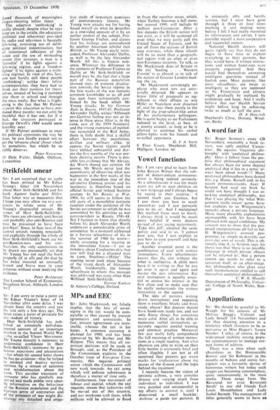A word for it
Sir: Roger Scruton's essay (28 November), ostensibly a book re- view, was aptly entitled 'Casuis- tries'. He equates 'linguistic phi- losophy' with 'analytical philoso- phy'. Does it follow from the pre- mise that philosophical argument has always been (in some degree) analytical that it has in a sense 'al- ways been about words'? I Many analytical philosophers have denied this, e.g. Hume, Russell and, in his recent pronouncements, Ayer. If Scruton had read my book he could not have thought I was at- tacking analytical philosophy, nor that I was playing the 'what Witt- genstein really meant' game. Scru- ton explains to us Wittgenstein's remarks about a private language. Many more plausible explanations incompatible with his have been affirmed with equal confidence. My concern was to show that the pro- posed interpretations all fail to ful- fil Wittgenstein's avowed pro- gramme, i.e. simply to describe our everyday uses of words. This is ob- viously true if, as Scruton says, his thesis was that 'there is no possible language in which private objects can be referred to'. that a person cannot use words to refer to a sensation itself, or an after-image. Are philosophers who gloss over such inconsistencies entitled to call themselves analytical philosophers?
C. W. K. Mundle Department of Philosophy, Univer- sity College of North Wales, Ban-. gor






































 Previous page
Previous page